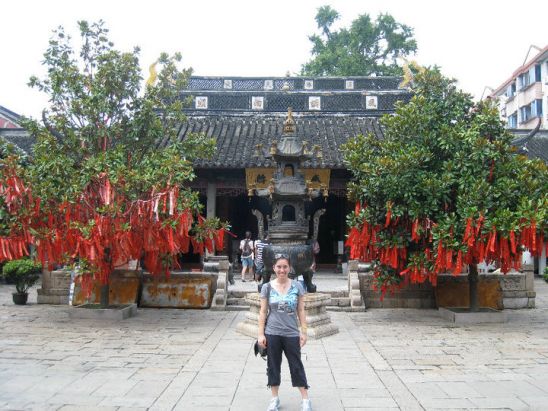My Visit to a Chinese Hospital

 Like any experienced traveler, I had made sure to purchase travel insurance before I set off for my year of study abroad in Beijing, China. I hadn’t expected to need it, though. I had been to China before, and I knew that as long as I stayed away from the tap water in China, I’d be good to go without any medical or health scares.
Like any experienced traveler, I had made sure to purchase travel insurance before I set off for my year of study abroad in Beijing, China. I hadn’t expected to need it, though. I had been to China before, and I knew that as long as I stayed away from the tap water in China, I’d be good to go without any medical or health scares.
I hadn’t counted on falling ill due to a non-food related reason, though.
One Monday afternoon, something got in my contact lens and greatly irritated my eye. That night, it got so bad that my eye couldn’t stop watering. My eye was so irritated that it was a bright, angry red; my eyelid had swollen so much that my eye looked as if it had shrunk half a size. Going to see a doctor only briefly crossed my mind before I brushed that idea aside. It was only something in my contact that was bothering me, after all. No big deal, right?
Fast forward to the next morning, where I discovered my attempts to flush out whatever was in my eye with water and a whole night of bed rest did nothing. My eye was just as inflamed as it had been the night before. In fact, it was arguably worse, as it couldn’t stop watering. When it physically hurt to keep my eye open, that’s when I decided it was time to suck it up and go to the hospital.
When one is in a foreign country and can’t see out of one eye, what can one do besides go to the hospital in an attempt to get full vision back?
Yes, hospital. People who I am close to know how I feel about hospitals; I hate going to the doctor and avoid anything remotely medically related at all costs. I don’t like being analyzed about my health history, I don’t like being poked and prodded, and I especially dislike taking medicine. But when one is in a foreign country and can’t see out of one eye, what can one do besides go to the hospital in an attempt to get full vision back?
I had put off going to the hospital the night before partly because I was afraid of the ordeal it would be to try and communicate with the hospital staff about my condition. It wasn’t that I couldn’t speak the language at all; in Beijing, I am studying Mandarin Chinese intensively. My language ability is decent, but I had never studied vocabulary relating to eye infections. My textbook had a chapter on going to the hospital, but I had studied that been weeks before this ordeal and I had never expected to actually use the vocabulary covered in that unit!
The Chinese hospital system is set up differently than the one in the US. There’s no concept of making an appointment in advance. A patient walks in and registers at the front desk, where he or she is given a number. Once that number is called, the patient can see the doctor. The doctor will examine what’s wrong and then will write out a prescription. Once the consultation is over, the patient pays the fee for both the consultation and whatever medicine he or she has been prescribed. The patient then goes to the pharmacy and gives the pharmacist your prescription slips, who gives the medicine in return.
It wasn’t too bad, actually. I was lucky that I didn’t really need to explain my condition in any great detail; all I had to do was point to my eye and the nurse understood what was wrong with me. I was prescribed two types of eye drops and was under orders to “not wear contact lenses” and to “use your eyes sparingly.” And the whole cost of the visit amounted to only 36RMB, which included everything from registration, consultation, and medicine. Not bad, huh?
Photo by Amanda O.









The only explanation I got was that it was inflamed – from what, I still don’t know!
I know how tiring eye infections can be. This sounds really scary. Did you ever find out what exactly the problem was?